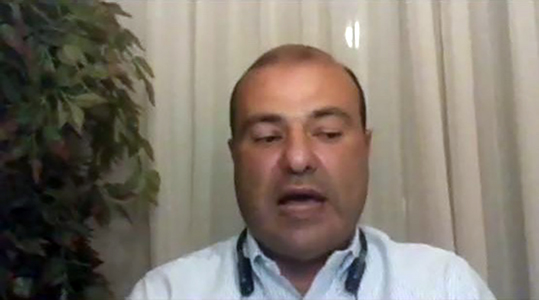The Secretary General of the Union of Arab Chambers, Dr. Khaled Hanafy, pointed out that "about 80% of global trade goes through commercial shipping, and maritime trade flows within the Mediterranean represent about 25% of the global traffic volume," noting that "the outbreak of the Corona epidemic had significant direct and indirect impacts on global shipping in light of the declining demand, adding that based on that, the global freight market is expected to decline by 7.5% in 2020, after witnessing a contraction of 1.7% in 2019.
Hanafy's words came during his participation in the panel discussion through the "Video Conference" feature organized by the Arab-Hellenic Chamber entitled: “Greece - Egypt: Prospects for Cooperation in Shipping, Port Industry & Shipyards”, under the auspices of the Union of Arab Chambers and the Greek Ministry of Maritime Affairs.
Hanafy affirmed that, “despite the current difficult circumstances, Egypt's ports such as Port Said, Damietta, Alexandria as well as Piraeus in Greece managed to remain open to shipping operations. However, the global container shipping volume is expected to decrease by at least 10% in 2020.” Pointing out that "Egyptian ports are shipping centers not only for the transportation of goods throughout the Greater Mediterranean region, but they represent a link with the remote ports in the Americas as well as in the Far East."
Hanafy explained that "the Egyptian economy, as well as the rest of the global economies, was affected by the measures taken to contain the virus, as well as through the sudden halt in tourism, low exports, low transfers and low revenues from the Suez Canal, but in response to fierce competition, the Egyptian ports and the Suez Canal Authority reduced ship fees Containers, and the Central Bank of Egypt has eased regulations to withdraw funds for individuals and private companies, and these restrictions now exclude the transportation and logistics sector from daily cash limits, allowing the flow of basic goods.
Dr. Hanafy revealed that Egypt has made significant progress in the emerging market logistics index, due to the numerous structural reforms that the Egyptian government has undertaken, which have helped stabilize the economy, and paved the way for strong private sector participation.
He also explained that, "today, a new generation of startups and businessmen is benefiting from targeted incentives and the expressed desire on the part of the Egyptian and Arab governments to help small and medium-sized companies thrive, and accordingly, it is expected that e-commerce in the Middle East will achieve significant growth in the next few years."
Hanafi considered that "the current crisis has painfully demonstrated that many ports are still lagging behind in keeping with the reality of e-commerce and data exchange, and for this reason, acceleration of digitization should be a top priority in the post-COVID-19 era, where the epidemic has brought about fundamental changes in the nature of the structure of demand and supply towards digital channels, including ocean freight, where the electronic bill, electronic documents and electronic payments has now become the difference between success and failure."
Hanafy expected future supply chains to become shorter and more diversified with support from advanced automation, which would reduce labor costs, while enhancing internet connectivity."
He also called for "the necessity of establishing a joint economic zone between Egypt and Greece that greatly enhances the vital interests of the two countries, as well as developing maritime and tourism cooperation, noting that tourism in Egypt will return starting from July 2020".
Source (Union of Arab Chambers)

